牛津大学申请材料
牛津大学风湿病和肌肉骨骼科学专业申请条件
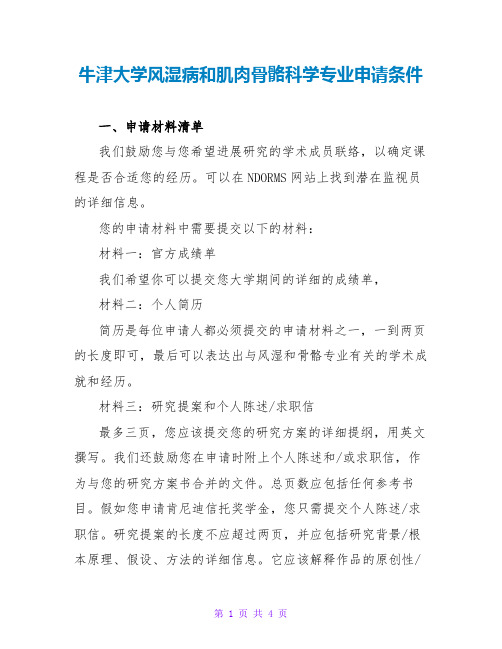
牛津大学风湿病和肌肉骨骼科学专业申请条件一、申请材料清单我们鼓励您与您希望进展研究的学术成员联络,以确定课程是否合适您的经历。
可以在NDORMS网站上找到潜在监视员的详细信息。
您的申请材料中需要提交以下的材料:材料一:官方成绩单我们希望你可以提交您大学期间的详细的成绩单,材料二:个人简历简历是每位申请人都必须提交的申请材料之一,一到两页的长度即可,最后可以表达出与风湿和骨骼专业有关的学术成就和经历。
材料三:研究提案和个人陈述/求职信最多三页,您应该提交您的研究方案的详细提纲,用英文撰写。
我们还鼓励您在申请时附上个人陈述和/或求职信,作为与您的研究方案书合并的文件。
总页数应包括任何参考书目。
假如您申请肯尼迪信托奖学金,您只需提交个人陈述/求职信。
研究提案的长度不应超过两页,并应包括研究背景/根本原理、假设、方法的详细信息。
它应该解释作品的原创性/新颖性,并概述如何在12个学术术语内完成它的承诺。
声明或求职信应说明您申请该课程的动机以及您的相关技能和经历。
我们将从以下方面来评估个人陈述/求职信:你的申请理由、学习领域的动机、持续和紧张工作的才能、推理才能、吸收新想法的才能,通常以抽象的方式快速呈现。
随着您调查证据和开发课程,随后您的想法在某些方面发生变化是正常的。
尽管如此,您仍应尽最大努力证明此时您的研究问题,来和方法的范围。
材料三:推荐信数量:三封要求:来自不同的学术性人员,最开场可以先提交两封,在审核完成之前,将最后一封提交给我们。
二、课程介绍风湿病和肌肉骨骼科学专业是该领域最大的欧洲学术部门,并在一项价值8500万英镑的拨款组合的支持下,开展了具有全球竞争力的研究和教学方案。
该学院由Andrew Carr教授领导,由约400名员工组成,其中包括约90名研究生和30多名教授,几名大学讲师和资深研究人员,均获得着名奖项。
NDORMS有两个研究所,即纳菲尔德骨科中心〔NOC〕工厂的Botnar研究中心和旧路校区的肯尼迪风湿病研究所。
英国牛津大学本科申请的条件
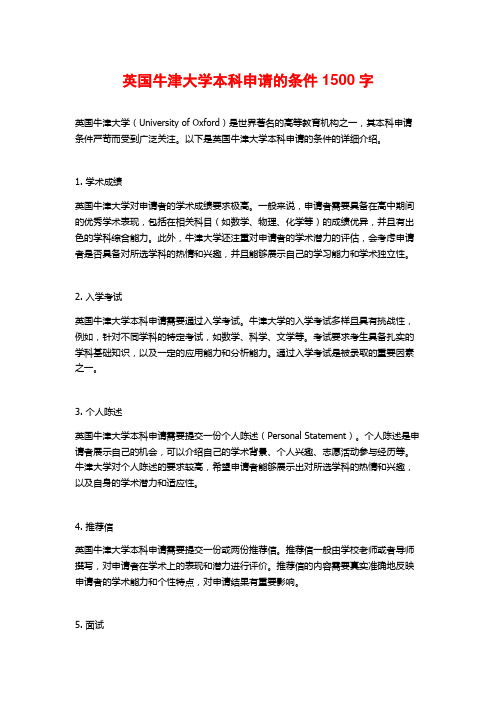
英国牛津大学本科申请的条件1500字英国牛津大学(University of Oxford)是世界著名的高等教育机构之一,其本科申请条件严苛而受到广泛关注。
以下是英国牛津大学本科申请的条件的详细介绍。
1. 学术成绩英国牛津大学对申请者的学术成绩要求极高。
一般来说,申请者需要具备在高中期间的优秀学术表现,包括在相关科目(如数学、物理、化学等)的成绩优异,并且有出色的学科综合能力。
此外,牛津大学还注重对申请者的学术潜力的评估,会考虑申请者是否具备对所选学科的热情和兴趣,并且能够展示自己的学习能力和学术独立性。
2. 入学考试英国牛津大学本科申请需要通过入学考试。
牛津大学的入学考试多样且具有挑战性,例如,针对不同学科的特定考试,如数学、科学、文学等。
考试要求考生具备扎实的学科基础知识,以及一定的应用能力和分析能力。
通过入学考试是被录取的重要因素之一。
3. 个人陈述英国牛津大学本科申请需要提交一份个人陈述(Personal Statement)。
个人陈述是申请者展示自己的机会,可以介绍自己的学术背景、个人兴趣、志愿活动参与经历等。
牛津大学对个人陈述的要求较高,希望申请者能够展示出对所选学科的热情和兴趣,以及自身的学术潜力和适应性。
4. 推荐信英国牛津大学本科申请需要提交一份或两份推荐信。
推荐信一般由学校老师或者导师撰写,对申请者在学术上的表现和潜力进行评价。
推荐信的内容需要真实准确地反映申请者的学术能力和个性特点,对申请结果有重要影响。
5. 面试英国牛津大学部分专业会进行面试(Interview)环节。
面试是申请者与学校面对面交流的机会,主要目的是更深入地了解申请者的学术水平、思维能力和适应性。
面试一般由学校的教授或相关学科的专家进行,并通过对申请者提问、讨论等方式进行。
除了以上基本条件外,英国牛津大学还会考虑申请者的其他综合素质,如领导才能、创新能力、社会实践经历、语言能力等。
申请者需提前了解所申请专业的具体要求和录取情况,并根据自身情况提升相关能力和准备申请材料。
牛津大学本科研究生申请条件
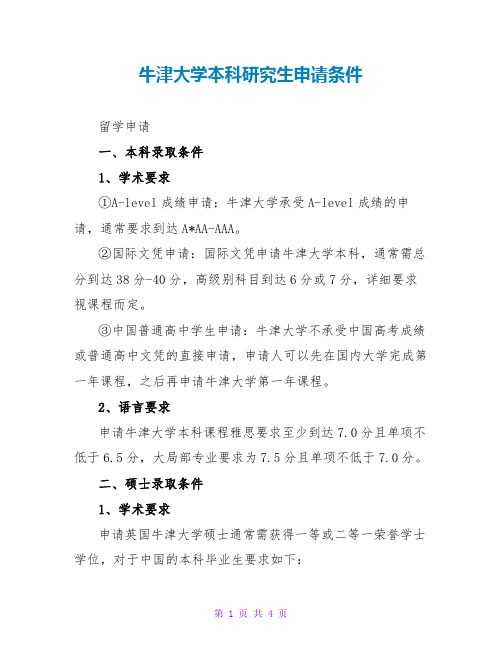
牛津大学本科研究生申请条件留学申请一、本科录取条件1、学术要求①A-level成绩申请:牛津大学承受A-level成绩的申请,通常要求到达A*AA-AAA。
②国际文凭申请:国际文凭申请牛津大学本科,通常需总分到达38分-40分,高级别科目到达6分或7分,详细要求视课程而定。
③中国普通高中学生申请:牛津大学不承受中国高考成绩或普通高中文凭的直接申请,申请人可以先在国内大学完成第一年课程,之后再申请牛津大学第一年课程。
2、语言要求申请牛津大学本科课程雅思要求至少到达7.0分且单项不低于6.5分,大局部专业要求为7.5分且单项不低于7.0分。
二、硕士录取条件1、学术要求申请英国牛津大学硕士通常需获得一等或二等一荣誉学士学位,对于中国的本科毕业生要求如下:①假如您所申请课程要求“英国大学二等一荣誉学士学位”,那么您需要获得双一流/211/985院校学士学位且均分到达85%及以上,其他机构要求90%及以上。
②假如您所申请课程要求“英国大学一等荣誉学士学位”,那么您需要获得双一流/211/985院校学士学位且均分到达90%及以上,其他机构要求95%及以上。
2、语言要求申请牛津大学硕士要求雅思到达7.0分-7.5分,此外也承受托福iBT等语言资格。
假如没有考取合格的雅思成绩,牛津大学提供线上语言课程,需当前的雅思成绩不低于所申请学位课程雅思要求的0.5分。
留学利弊一、优点•位于牛津的中间位置,出行方便,挨着Tescos和Sainsbury’s,离菜市场和主干道上的餐厅都很近。
•有很多JCR〔类似于大学生活动中心〕,用来组织慈善活动、运动开放日、社交联谊等活动。
•有学院专属餐吧,日间提供三餐和各类小吃酒水,很多人在这里玩。
•酒吧由学生组织运营,位于大活地下,提供各种酒和软饮,还有自动唱机,抢答器,飞镖,桌上足球,台球等娱乐设施!最廉价最热闹酒吧之一。
提供兼职岗位。
•位于食堂地下的Buttery,日间提供各类茶饮,咖啡,酒水。
牛津大学 University of Oxford_入学要求_录取条件_专业学费_世界排名_2018申请指南

牛津大学University of Oxford_入学要求_录取条件_专业学费_世界排名_2018申请指南牛津大学简介:牛津大学(University of Oxford)是英国一所著名的公立研究型大学,坐落在英格兰东南部的牛津市,确切成立的年份已不可考,最早的授课记录是1096年。
牛津大学是现存世界上第二古老的高等学府,仅次于意大利的博洛尼亚大学,自1167年英王亨利二世禁止英格兰学生前往巴黎大学求学以来便获得了长足的发展。
炎裔留学专家表示牛津大学是世界上最负盛誉、历史最为悠久的高等学校之一,以其为蓝本,在世界上建立的大学不可胜数。
1209年,因与牛津本地居民的一次争吵,部分牛津师生离开了牛津,向其东北部迁移,并在当地建立了一所大学——也就是今日与牛津齐名的剑桥大学,二者合成“牛剑(Oxbridge)”。
牛津大学实行书院联邦制,整个学校包含有38个书院,每个书院都有很大的自主权,包括招生、课程设置、住宿、迎新及毕业活动等,但学校的课程、实验室、设备、资源、图书馆等都是共享的。
实行书院联邦制的学校还有剑桥大学、哈佛大学、耶鲁大学、加州大学圣地亚哥分校等,几乎都是源出牛津大学。
学术声誉牛津大学有世界上最著名的几种奖学金,包括2001年开始发放的克莱伦登奖学金和素有“本科生诺贝尔奖”之称的罗德奖学金。
克莱伦登奖学金的作用与罗德奖学金相似,但克莱伦登奖学金不单面向国际学生发放,英国本土学生亦可以获得。
克莱伦登奖学金可以覆盖全额的学费和生活费,面向前往牛津大学就读的授课型硕士、研究型硕士或博士项目学生。
罗德奖学金始于1902年,被誉为世界上最慷慨的奖学金之一,发放给世界上最有天赋的本科学生,支持其前往牛津大学完成其研究生学业。
现时世界上是有多种奖学金是模仿罗德奖学金的,如英国的哈克尼斯奖学金、肯尼迪奖学金、牛顿奖学金以及美国的马歇尔奖学金等。
牛津大学拥有世界上最大的大学出版社——最为中国学生知名的便是《牛津词典》——,拥有英国最大的学术图书馆系统。
牛津大学申请条件
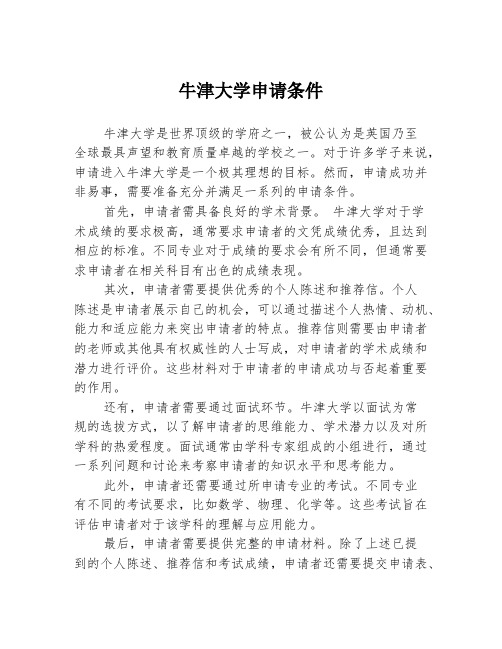
牛津大学申请条件牛津大学是世界顶级的学府之一,被公认为是英国乃至全球最具声望和教育质量卓越的学校之一。
对于许多学子来说,申请进入牛津大学是一个极其理想的目标。
然而,申请成功并非易事,需要准备充分并满足一系列的申请条件。
首先,申请者需具备良好的学术背景。
牛津大学对于学术成绩的要求极高,通常要求申请者的文凭成绩优秀,且达到相应的标准。
不同专业对于成绩的要求会有所不同,但通常要求申请者在相关科目有出色的成绩表现。
其次,申请者需要提供优秀的个人陈述和推荐信。
个人陈述是申请者展示自己的机会,可以通过描述个人热情、动机、能力和适应能力来突出申请者的特点。
推荐信则需要由申请者的老师或其他具有权威性的人士写成,对申请者的学术成绩和潜力进行评价。
这些材料对于申请者的申请成功与否起着重要的作用。
还有,申请者需要通过面试环节。
牛津大学以面试为常规的选拔方式,以了解申请者的思维能力、学术潜力以及对所学科的热爱程度。
面试通常由学科专家组成的小组进行,通过一系列问题和讨论来考察申请者的知识水平和思考能力。
此外,申请者还需要通过所申请专业的考试。
不同专业有不同的考试要求,比如数学、物理、化学等。
这些考试旨在评估申请者对于该学科的理解与应用能力。
最后,申请者需要提供完整的申请材料。
除了上述已提到的个人陈述、推荐信和考试成绩,申请者还需要提交申请表、个人简历和其他相关材料。
这些材料的完整性和准确性对于申请的成功至关重要。
总而言之,申请牛津大学是一项具有挑战性的任务,需要准备和努力。
除了符合学术要求外,个人陈述、推荐信、面试和专业考试都是重要的选拔环节。
通过对这些申请条件的深入了解和准备,申请者将增加成功申请进入牛津大学的机会。
英国牛津大学录取条件是什么.doc
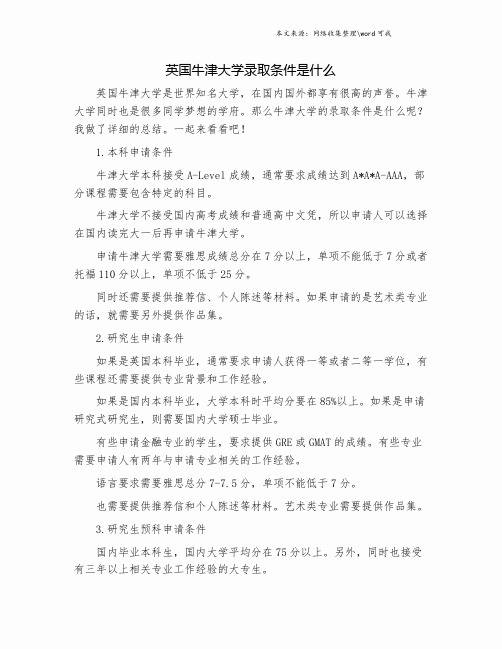
英国牛津大学录取条件是什么英国牛津大学是世界知名大学,在国内国外都享有很高的声誉。
牛津大学同时也是很多同学梦想的学府。
那么牛津大学的录取条件是什么呢?我做了详细的总结。
一起来看看吧!1.本科申请条件牛津大学本科接受A-Level成绩,通常要求成绩达到A*A*A-AAA,部分课程需要包含特定的科目。
牛津大学不接受国内高考成绩和普通高中文凭,所以申请人可以选择在国内读完大一后再申请牛津大学。
申请牛津大学需要雅思成绩总分在7分以上,单项不能低于7分或者托福110分以上,单项不低于25分。
同时还需要提供推荐信、个人陈述等材料。
如果申请的是艺术类专业的话,就需要另外提供作品集。
2.研究生申请条件如果是英国本科毕业,通常要求申请人获得一等或者二等一学位,有些课程还需要提供专业背景和工作经验。
如果是国内本科毕业,大学本科时平均分要在85%以上。
如果是申请研究式研究生,则需要国内大学硕士毕业。
有些申请金融专业的学生,要求提供GRE或GMAT的成绩。
有些专业需要申请人有两年与申请专业相关的工作经验。
语言要求需要雅思总分7-7.5分,单项不能低于7分。
也需要提供推荐信和个人陈述等材料。
艺术类专业需要提供作品集。
3.研究生预科申请条件国内毕业本科生,国内大学平均分在75分以上。
另外,同时也接受有三年以上相关专业工作经验的大专生。
语言成绩要求6.5分,单项成绩不低于6分。
4.博士申请条件国内大学研究生学位,211或者985大学,平均分不低于85分。
普通大学要求平均分达到90分以上。
需要提供2000字左右的论文以及研究计划。
申请时间牛津大学硕士学位课程的申请渠道通常在9月开放。
第一轮申请的截止日期通常在2020年1月中或下旬。
具体截止时间取决于课程。
如果你需要申请签证,最好在1月之前申请。
面试一般来说,在申请截止日期后的8-10周内,牛津大学会发出录取通知书。
例如,对于截止日期为1月的申请,您通常可以在3月底到4月初收到offer,但要在申请后才发出。
英国留学牛津大学介绍及申请指导样本
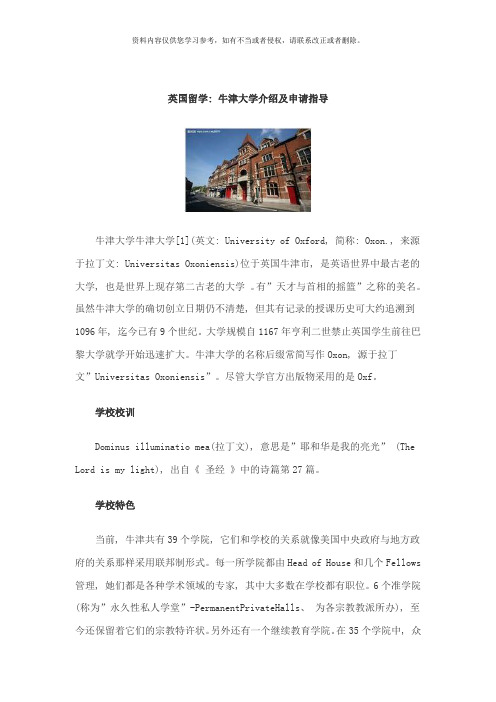
英国留学: 牛津大学介绍及申请指导牛津大学牛津大学[1](英文: University of Oxford, 简称: Oxon., 来源于拉丁文: Universitas Oxoniensis)位于英国牛津市, 是英语世界中最古老的大学, 也是世界上现存第二古老的大学。
有”天才与首相的摇篮”之称的美名。
虽然牛津大学的确切创立日期仍不清楚, 但其有记录的授课历史可大约追溯到1096年, 迄今已有9个世纪。
大学规模自1167年亨利二世禁止英国学生前往巴黎大学就学开始迅速扩大。
牛津大学的名称后缀常简写作Oxon, 源于拉丁文”Universitas Oxoniensis”。
尽管大学官方出版物采用的是Oxf。
学校校训Dominus illuminatio mea(拉丁文), 意思是”耶和华是我的亮光” (The Lord is my light), 出自《圣经》中的诗篇第27篇。
学校特色当前, 牛津共有39个学院, 它们和学校的关系就像美国中央政府与地方政府的关系那样采用联邦制形式。
每一所学院都由Head of House和几个Fellows 管理, 她们都是各种学术领域的专家, 其中大多数在学校都有职位。
6个准学院(称为”永久性私人学堂”-PermanentPrivateHalls、为各宗教教派所办), 至今还保留着它们的宗教特许状。
另外还有一个继续教育学院。
在35个学院中, 众灵学院当前没有学生, 只有院士(包括访问院士)。
各学院规模不等, 但都在500人以下, 学生、教师(院士)来自不同的专业学科。
除学院外, 牛津大学的教学和研究活动(特别是后者), 主要由学部来组织, 学部不是大学内的自治单位, 它们都是跨学院的机构, 不附属于任何一个学院, 不过各学部的教师和学生, 首先必须是牛津大学内某一学院的一员。
牛津现有16个学部: 人类学和地理学学部, 生物科学学部, 临床医学学部, 英语和文学学部, 法学学部, 经典、哲学和古代历史学部, 数学学部, 中世纪和现代语言学部, 现代历史学部, 音乐学部, 东方学学部, 物理科学学部, 生理科学学部, 心理学学部, 社会学学部, 神学学部, 文科学部下一般不再分系, 理科学部下又分成30多个系, 有的学部还设一些中心和研究所。
英国牛津布鲁克斯大学个人简历怎么写
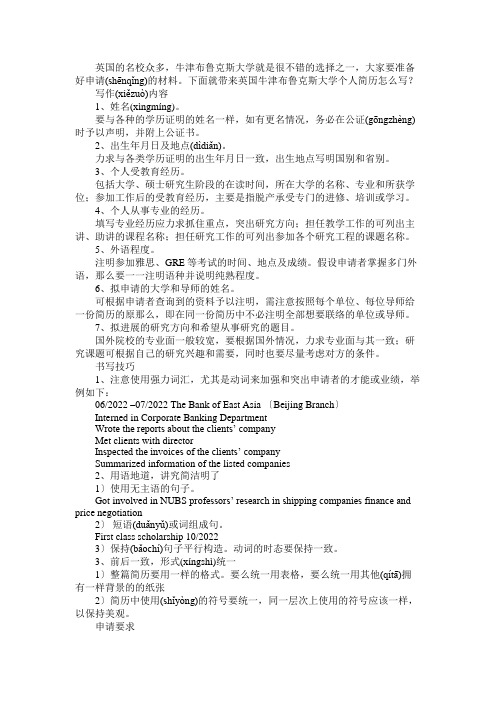
英国的名校众多,牛津布鲁克斯大学就是很不错的选择之一,大家要准备好申请(shēnqǐng)的材料。
下面就带来英国牛津布鲁克斯大学个人简历怎么写?写作(xiězuò)内容1、姓名(xìngmíng)。
要与各种的学历证明的姓名一样,如有更名情况,务必在公证(gōngzhèng)时予以声明,并附上公证书。
2、出生年月日及地点(dìdiǎn)。
力求与各类学历证明的出生年月日一致,出生地点写明国别和省别。
3、个人受教育经历。
包括大学、硕士研究生阶段的在读时间,所在大学的名称、专业和所获学位;参加工作后的受教育经历,主要是指脱产承受专门的进修、培训或学习。
4、个人从事专业的经历。
填写专业经历应力求抓住重点,突出研究方向;担任教学工作的可列出主讲、助讲的课程名称;担任研究工作的可列出参加各个研究工程的课题名称。
5、外语程度。
注明参加雅思、GRE等考试的时间、地点及成绩。
假设申请者掌握多门外语,那么要一一注明语种并说明纯熟程度。
6、拟申请的大学和导师的姓名。
可根据申请者查询到的资料予以注明,需注意按照每个单位、每位导师给一份简历的原那么,即在同一份简历中不必注明全部想要联络的单位或导师。
7、拟进展的研究方向和希望从事研究的题目。
国外院校的专业面一般较宽,要根据国外情况,力求专业面与其一致;研究课题可根据自己的研究兴趣和需要,同时也要尽量考虑对方的条件。
书写技巧1、注意使用强力词汇,尤其是动词来加强和突出申请者的才能或业绩,举例如下:06/2022 –07/2022 The Bank of East Asia 〔Beijing Branch〕Interned in Corporate Banking DepartmentWrote the reports about the clients’ companyMet clients with directorInspected the invoices of the clients’ companySummarized information of the listed companies2、用语地道,讲究简洁明了1〕使用无主语的句子。
牛津大学纳菲尔德临床医学院申请条件

牛津大学纳菲尔德临床医学院申请条件纳菲尔德临床医学院申请条件一、课程简介纳菲尔德临床医学院开展的所有研究背后的根底动力是追求卓越的学术成就以及研究对全球社会安康和福祉的积极影响。
该学院因其在根底科学方面的工作而享有较高的临床或应用工作的声誉。
每年1.3亿英镑的拨款收入中的大局部都用于理解生物学和疾病发病机制的最根本原理。
除了在牛津的研究和临床承诺外,该学院还在泰国,越南和肯尼亚设有主要的海外课程。
纳菲尔德临床医学院每年约有60名研究生,其中大多数正在攻读哲学博士〔哲学博士〕学位,这是牛津大学的博士学位。
该系还提供国际安康和热带医学硕士学位,每年约有20名学生。
国际安康和热带医学理学硕士课程是一项为期一年的全日制多学科和跨学科课程,旨在研究资有限环境下人口安康面临的主要挑战。
该课程包含在牛津大学医学院牛津热带医学和全球安康中心。
该课程旨在培养对资有限环境中的主要全球安康问题及其潜在解决方案的知识和理解;用于分析^p 全球安康问题的研究技术的知识和技能,包括定量和定性研究方法,以及在其他专业领域进展培训的时机;批判性评估全球卫生证据的才能;在资有限的环境中研究特定安康问题的技能和理论经历。
第一个任期将包括研究方法的核心主题,一些主要全球卫生挑战的概述,以及与全球卫生研究和理论相关的主题。
核心的课程包括:全球卫生的范例和工具〔包括流行病学、统计学、卫生经济学和卫生社会科学〕、国际卫生的挑战与变化、全球卫生研究与理论、核心材料将在Trinity术语第0周的两篇看不见的论文中进展评估。
在第二学期期间,除了一些持续的核心内容之外,您还可以选择以下六个课程选项中的两个进展进一步研究:疫苗学、生殖,孕产妇,新生儿和儿童安康、现场流行病学案例研究、国际开展与安康、开展,环境与安康、感染疾病的数学建模、您将在4月初提交两篇3,000至4,000字的论文,与您选择的可选课程相关。
第三个学期很可能是在海外,并且在资有限的情况下,在全球安康课程的根底上进展了为期八周的资助。
英国留学牛津大学研究生申请书
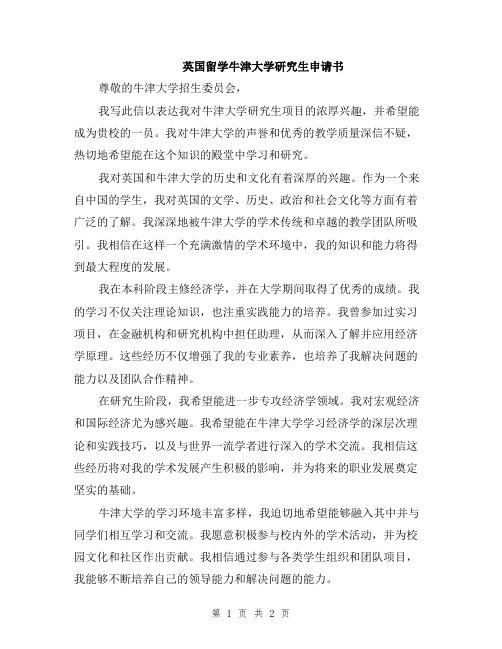
英国留学牛津大学研究生申请书尊敬的牛津大学招生委员会,我写此信以表达我对牛津大学研究生项目的浓厚兴趣,并希望能成为贵校的一员。
我对牛津大学的声誉和优秀的教学质量深信不疑,热切地希望能在这个知识的殿堂中学习和研究。
我对英国和牛津大学的历史和文化有着深厚的兴趣。
作为一个来自中国的学生,我对英国的文学、历史、政治和社会文化等方面有着广泛的了解。
我深深地被牛津大学的学术传统和卓越的教学团队所吸引。
我相信在这样一个充满激情的学术环境中,我的知识和能力将得到最大程度的发展。
我在本科阶段主修经济学,并在大学期间取得了优秀的成绩。
我的学习不仅关注理论知识,也注重实践能力的培养。
我曾参加过实习项目,在金融机构和研究机构中担任助理,从而深入了解并应用经济学原理。
这些经历不仅增强了我的专业素养,也培养了我解决问题的能力以及团队合作精神。
在研究生阶段,我希望能进一步专攻经济学领域。
我对宏观经济和国际经济尤为感兴趣。
我希望能在牛津大学学习经济学的深层次理论和实践技巧,以及与世界一流学者进行深入的学术交流。
我相信这些经历将对我的学术发展产生积极的影响,并为将来的职业发展奠定坚实的基础。
牛津大学的学习环境丰富多样,我迫切地希望能够融入其中并与同学们相互学习和交流。
我愿意积极参与校内外的学术活动,并为校园文化和社区作出贡献。
我相信通过参与各类学生组织和团队项目,我能够不断培养自己的领导能力和解决问题的能力。
此外,我个人也有很强的研究兴趣。
在本科阶段,我就曾参与了一项关于中国经济发展的研究项目,并为该项目撰写了相关报告。
这个经历让我深感研究的重要性和挑战性。
我相信在牛津大学的学习和研究中,我将有机会继续深入地研究自己感兴趣的领域,并为学术界和社会做出一定的贡献。
最后,我想强调,我选择牛津大学是基于对贵校的深入了解和对自己学术发展的追求。
我相信世界一流的教学资源和学术环境将为我提供无限的可能性和机会。
我深信牛津大学是我继续深造和发展的理想场所。
英国留学牛津大学研究生申请书范文
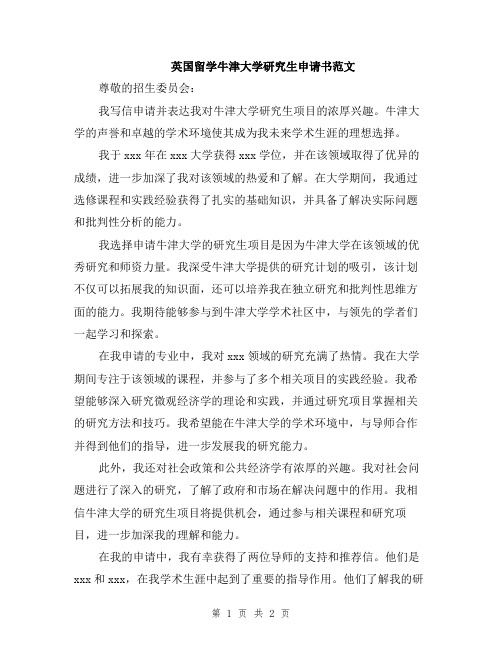
英国留学牛津大学研究生申请书范文尊敬的招生委员会:我写信申请并表达我对牛津大学研究生项目的浓厚兴趣。
牛津大学的声誉和卓越的学术环境使其成为我未来学术生涯的理想选择。
我于xxx年在xxx大学获得xxx学位,并在该领域取得了优异的成绩,进一步加深了我对该领域的热爱和了解。
在大学期间,我通过选修课程和实践经验获得了扎实的基础知识,并具备了解决实际问题和批判性分析的能力。
我选择申请牛津大学的研究生项目是因为牛津大学在该领域的优秀研究和师资力量。
我深受牛津大学提供的研究计划的吸引,该计划不仅可以拓展我的知识面,还可以培养我在独立研究和批判性思维方面的能力。
我期待能够参与到牛津大学学术社区中,与领先的学者们一起学习和探索。
在我申请的专业中,我对xxx领域的研究充满了热情。
我在大学期间专注于该领域的课程,并参与了多个相关项目的实践经验。
我希望能够深入研究微观经济学的理论和实践,并通过研究项目掌握相关的研究方法和技巧。
我希望能在牛津大学的学术环境中,与导师合作并得到他们的指导,进一步发展我的研究能力。
此外,我还对社会政策和公共经济学有浓厚的兴趣。
我对社会问题进行了深入的研究,了解了政府和市场在解决问题中的作用。
我相信牛津大学的研究生项目将提供机会,通过参与相关课程和研究项目,进一步加深我的理解和能力。
在我的申请中,我有幸获得了两位导师的支持和推荐信。
他们是xxx和xxx,在我学术生涯中起到了重要的指导作用。
他们了解我的研究兴趣和能力,并认为我对牛津大学的研究生项目非常适合。
我相信他们的推荐信将证明我在学术领域的能力和潜力。
最后,我相信我作为一名研究生候选人的独特之处在于我的责任心和勤奋努力的工作态度。
我注重细节,善于组织和协调工作,并且具备良好的团队合作能力。
我相信这些优势将对我的研究工作和学术生涯产生积极影响。
我希望通过本申请书能够向招生委员会展示我的学术潜力和对牛津大学的热爱。
我相信在牛津大学的学术环境中,我将有机会与优秀的学者们共事,并为该领域的研究做出贡献。
oxford投稿流程
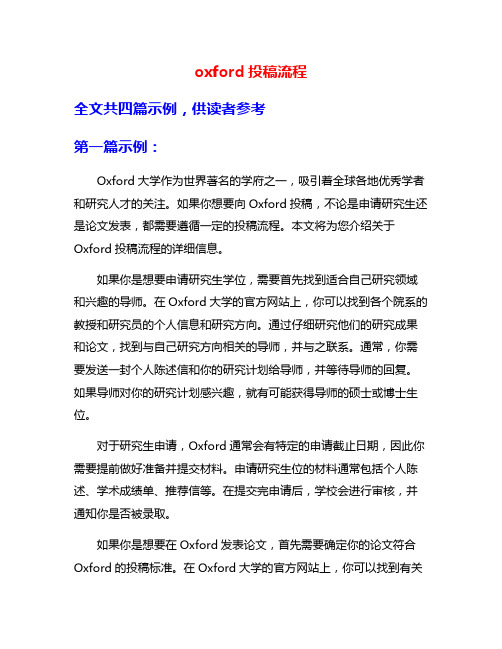
oxford投稿流程全文共四篇示例,供读者参考第一篇示例:Oxford大学作为世界著名的学府之一,吸引着全球各地优秀学者和研究人才的关注。
如果你想要向Oxford投稿,不论是申请研究生还是论文发表,都需要遵循一定的投稿流程。
本文将为您介绍关于Oxford投稿流程的详细信息。
如果你是想要申请研究生学位,需要首先找到适合自己研究领域和兴趣的导师。
在Oxford大学的官方网站上,你可以找到各个院系的教授和研究员的个人信息和研究方向。
通过仔细研究他们的研究成果和论文,找到与自己研究方向相关的导师,并与之联系。
通常,你需要发送一封个人陈述信和你的研究计划给导师,并等待导师的回复。
如果导师对你的研究计划感兴趣,就有可能获得导师的硕士或博士生位。
对于研究生申请,Oxford通常会有特定的申请截止日期,因此你需要提前做好准备并提交材料。
申请研究生位的材料通常包括个人陈述、学术成绩单、推荐信等。
在提交完申请后,学校会进行审核,并通知你是否被录取。
如果你是想要在Oxford发表论文,首先需要确定你的论文符合Oxford的投稿标准。
在Oxford大学的官方网站上,你可以找到有关各个期刊和出版社的投稿要求和指引。
在准备投稿前,建议你仔细阅读相应期刊的投稿指南,确保你的论文符合他们的要求。
通常,你需要准备好完整的论文、摘要、关键词、以及作者简介等内容,然后通过期刊网站或邮箱提交论文。
一旦你的论文被接受,通常会经过同行评审的程序。
同行评审是一种权威审查论文质量的方法,通过匿名评审专家对论文内容、方法和结论进行评价。
如果你的论文通过同行评审,并最终被期刊接受发表,恭喜你!你的研究成果将被全球学术界所认可。
Oxford的投稿流程要求严格,但只要你认真准备、按照要求提交,就有机会获得录取或发表机会。
希望本文对你有所帮助,祝你在Oxford的投稿之路上取得成功!第二篇示例:Oxford University Press(以下简称OUP)是世界著名的学术出版机构之一,也是英国牛津大学的出版部门。
申请国外大学材料

申请国外大学材料在申请国外大学时,需要准备的材料是非常重要的。
这些材料将直接影响到你的申请结果,因此需要认真准备和整理。
以下是申请国外大学所需的材料清单:1. 学术成绩单,学术成绩单是申请国外大学时最重要的材料之一。
它记录了你在学校的学习成绩和课程表现,是大学招生委员会评估你学术能力的重要依据。
因此,一定要确保学术成绩单的准确性和完整性。
2. 推荐信,推荐信是申请国外大学时必不可少的材料之一。
一般来说,需要提供两到三封推荐信。
推荐人可以是你的老师、导师或者其他熟悉你学术能力和个人品质的人士。
推荐信的内容应该真实客观地评价你的学术能力、性格特点和适应能力。
3. 个人陈述/申请文书,个人陈述是申请国外大学时的重要材料之一,也是展示个人能力和特点的重要途径。
在个人陈述中,你需要清晰地表达自己的学术目标、职业规划和个人发展,突出自己的特长和优势,吸引招生委员会的注意。
4. 英语水平证明,大部分国外大学的教学语言是英语,因此需要提供相应的英语水平证明。
一般来说,可以通过提供托福、雅思或者其他英语水平考试成绩单来证明自己的英语水平。
5. 护照和签证,申请国外大学需要提前准备好护照和签证。
确保护照的有效期足够长,并且及时办理签证手续,以免耽误入学时间。
6. 其他材料,根据不同学校和专业的要求,还可能需要提供其他材料,比如艺术作品集、科研成果、实习证明等。
务必根据学校的要求,准备好所有需要的材料。
总之,申请国外大学的材料准备是一个复杂且重要的过程。
需要提前规划和准备,确保所有材料的完整性和准确性。
只有这样,才能提高申请成功的机会,顺利进入理想的国外大学。
希望以上内容对你有所帮助,祝你申请顺利!。
牛津大学英语个人陈述范文
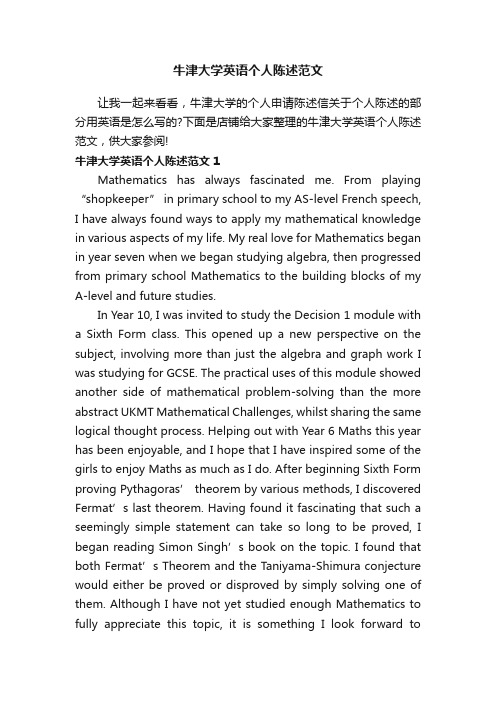
牛津大学英语个人陈述范文让我一起来看看,牛津大学的个人申请陈述信关于个人陈述的部分用英语是怎么写的?下面是店铺给大家整理的牛津大学英语个人陈述范文,供大家参阅!牛津大学英语个人陈述范文1Mathematics has always fascinated me. From playing “shopkeeper” in primary school to my AS-level French speech, I have always found ways to apply my mathematical knowledge in various aspects of my life. My real love for Mathematics began in year seven when we began studying algebra, then progressed from primary school Mathematics to the building blocks of my A-level and future studies.In Year 10, I was invited to study the Decision 1 module with a Sixth Form class. This opened up a new perspective on the subject, involving more than just the algebra and graph work I was studying for GCSE. The practical uses of this module showed another side of mathematical problem-solving than the more abstract UKMT Mathematical Challenges, whilst sharing the same logical thought process. Helping out with Year 6 Maths this year has been enjoyable, and I hope that I have inspired some of the girls to enjoy Maths as much as I do. After beginning Sixth Form proving Pythagoras’ theorem by various methods, I discovered Fermat’s last theorem. Having found it fascinating that such a seemingly simple statement can take so long to be proved, I began reading Simon Singh’s book on the topic. I found that both Fermat’s Theorem and the Taniyama-Shimura conjecture would either be proved or disproved by simply solving one of them. Although I have not yet studied enough Mathematics to fully appreciate this topic, it is something I look forward tostudying in the future.Along with Mathematics I also enjoy Physics, and since many topics in the two subjects are very similar, such as the equations of motion and resolving forces. Studying the equations of motion last year, I saw how they were derived from Mathematics, by finding gradients and areas under graphs. As part of the Engineering Education Scheme, I had to explain the use of maths and physics in our project to other students and engineers.In my spare time, I regularly help out in the community. I have worked at Oxfam since year 10, where I do a wide range of jobs including cashing up and checking the takings for the week. After my GCSEs, I took part in the Millennium Volunteers Project, volunteering at CSV Media Clubhouse. Whilst there, I created various databases and worked on reception. Volunteering has greatly improved my confidence, leadership and teamwork skills, whilst enabling me to help others. I have also held editorial roles in two school magazines; both of which received the Searchlight Cup for Teamwork. This gave me experience of working to, and motivating others to meet deadlines, whilst producing a final product that we were all proud to have been a part of. Achieving my Brown Belt in Karate meant that I had to be dedicated to training up to four times a week, and also able to teach others in the class.In October 2007, I won an internship at BT specialising in cross-media communications research. This was a rewarding experience, as I saw some of the new technology being developed, learnt how to write a report of my research findings, and made a 40-minute presentation on my experience at BT. I am not afraid of speaking in public, having given many whole-school assemblies. In summer, I achieved runner-up in the GDSTSomerville and Gurney Essay competition, which was very different to the science and French I had been studying, but also presented some interesting topics to write about, drawing from both personal experience and current events.I am looking forward to all the academic challenges at university, and know that I will make the most of university life to pursue my subject in the greatest depth possible.牛津大学英语个人陈述范文2Shelley's belief that poets are the "unacknowledged legislators of the world" might seem like an exaggeration to some people, but in my opinion, his essay "A Defence of Poetry" eloquently expresses the importance of poetry, and other forms of literature. Studying literature is intrinsically valuable, but it also helps to illuminate other aspects of culture. Writers, as Shelley observed, "apprehend the true and the beautiful" while reflecting the society in which they live. It is the catholic nature of literature that I find intriguing, which is why I am keen to study English Literature at a higher level.I have enjoyed the English Literature A-Level course, with the variety of texts covered and the challenges of writing more sophisticated essays. I particularly enjoyed studying Keats's poetry, as I have a deep appreciation of the Romantics; I find the expression of Shelley's spiritual and political beliefs in his poetry especially interesting. I also read widely for pleasure, from Angela Carter's magic realist novels to the satirical writing of Evelyn Waugh. I have recently become interested in the work of English novelists from the modernist era, including Virginia Woolf and Patrick Hamilton. Hamilton's work has, I believe, been unfairly neglected; his astute observations of relationships and his ability to explore darker sides of human nature make him a writerworthy of study.My own attempts at creative writing have helped me to appreciate the challenges of writing novels, and to understand the thoughts and intentions of certain novelists. I admire "Lolita" by Vladimir Nabokov and Gunter Grass's "The Tin Drum" in particular, the former as a "love letter to the English language" and the latter for its playful, subversive style and idiosyncratic narrator. Through the voice of Oskar Matzerath, Grass conveys the horrors of Nazism, but reminds the reader that in spite of Hitler's nihilistic attitude towards the arts, creativity could not be suppressed, thus conveying both the true and the beautiful.Attending performances of plays by Euripides ("The Bacchae" and "Women of Troy" as well as seeing "King Lear" at the Globe and an adaptation of one of my favourite novels, Patrick Hamilton's "Hangover Square", has increased my appreciation and understanding of the texts. I also subscribe to the "Times Literary Supplement", which has helped me to discover new critical approaches to literature, as well as enabling me to learn of important new publications.My other A-Level subjects complement my study of English Literature very well. Writing History essays has encouraged me to develop my analytical skills, and I believe that reading the works of classical writers such as Homer and Sophocles is essential for any English Literature student.I have a wide variety of interests, and spend much of my spare time visiting art galleries and museums. Furthermore, I have found taking part in the "Share the Care" project, which involves helping a fourteen year old disabled girl to gain more independence, extremely rewarding.English Literature, for me, is not merely an academic subjectbut an interest which influences many different areas of my life, whether I am reading significant works of the Victorian canon or writing my thoughts on novels in my reading journal. Consequently, I am thoroughly looking forward to the prospect of studying English Literature at university.牛津大学英语个人陈述范文3The bell has just tolled the hour. It is 11pm now. I have just got back from the library. After having a cup of tea, I am happy to find time to write my personal statement.If asked to describe myself in the briefest way, I’d say: a keen language learner. I’ve been studying the ancient Chinese for over 15 years, English 11 years, Spanish 3 years, and French and Japanese, each for a semester. Linguistics being my primary interest and sole concern in my life, Beijing Foreign Studies University (BFSU), China’s leading institution in language teaching and linguistics studies, is where I come from.Majoring in English, I currently rank within the top five students among 90 peers in the department. Given that my first year GPA was only mediocre, the progress I’ve made is truly remarkable. More important, I have studied Linguistics in a broad range that goes beyond the knowledge covered in class. Generally I regard language study as the center of my interests and explore its interface with peripheral areas, such as sociology, psychology and philosophy.Initially attracted to General Linguistics, I audited classes in the graduate program of Linguistics at BFSU when I was a sophomore and became an avid student in subjects such as lexis, semantics, syntax, and morphology. Among all my readings, it is William Labov’s early work on class-based variation in the speech of New York and elsewhere that impressed me most,which compelled me to delve deeper into the field of Sociolinguistics. Last semester, I worked as a research assistant to Professor Qian Qiang at Beijing University in Conversation Analysis. Currently I am working on two research papers, namely, ‘Age as a non-linguistic variable’ and ‘Conversation analysis of online students at BFSU’. Forever exploring new horizons, I also study Second Language Acquisition, based on my professional experiences.My professional experiences began as an International News Editor in the Beijing Television Station in April 2001. My main responsibility back then was to translate and edit English news into Chinese news format and to dub the English news. In July 2001, I joined the Beijing Global Translation and Consulting Company setup by Yang Lixin, Professor of English with BFSU. Our translation group in the company currently research in the field of Translation Method, or more specifically, Translation of Insurance English to Chinese and related Quantitative Methods. Besides, I am a Teaching Assistant in the Institute of Online Education at BFSU, designing and hosting the online oral English class every week.These experiences have nourished passionate love of languages in my heart since a long time ago. It is my belief that humans need to study language more. I appreciate that saying from French anthropologist Levi Strauss, “To say language is to say society.” Linguistics is such a subject that is never isolated from other subjects, and instead, it is a unified one that goes beyond the realms of culture and generation. It can reach the soul of wit. It is my great honor that I have had it as a faithful company for all these years.My personal objective is to attain a Ph.D in Linguistics and tobecome an expert in this field so as to contribute to the development of linguistics as a discipline in Chinese universities and colleges. I’d highly appreciate your favorable consideration on my application, and it is my cherished dream that some day, when asked to describe myself in the briefest way, I can proudly say: I am a linguist.。
牛津大学申请必备
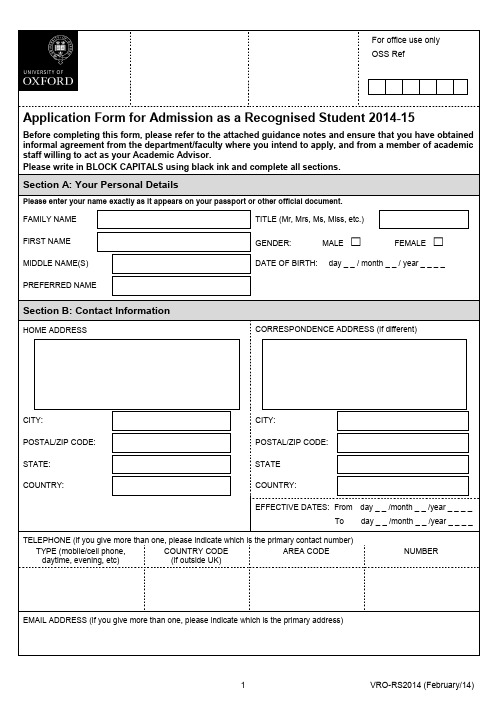
2
VRO-RS2014 (February/14)
Section G: Sponsor/Funding Source
Please refer to the attached guidance notes and enter the code most appropriate to you:
Yes Yes
No No
Section E: Disability
Please refer to the attached guidance notes and enter the code most appropriate to you:
Section F: Term Time Accommodation
CITY: POSTAL/ZIP CODE: STATE: COUNTRY:
CITY: POSTAL/ZIP CODE: STATE COUNTRY: EFFECTIVE DATES: From day _ _ /month _ _ /year _ _ _ _ To day _ _ /month _ _ /year _ _ _ _
University/Institution attended Start year Year of completion Qualification obtained or studying for (e.g. BA, MSc) Main subject (e.g. Chemistry, English) Result (grade, classification, GPA etc.)
牛津大学研究生申请入学的条件

牛津大学研究生申请入学的条件一、入学要求学术:想要进入到牛津大学读研究生,需要报考的学生在国内的211/985学校本科毕业拿到本科学士学位,要求在大学时期的平均分要到达85-90分以上,并且需要有相关的本科专业背景,比方报考计算机专业的学生需要有计算机或数学相关的专业背景,报考该校的化学专业需要有化学、生物科学、或物理相关的背景。
语言:该校的研究生通常要求学生的IELTS的考试分数考到7.0分及以上,并且单向的考试分数不低于6.5分,报考商科、法律或计算机科学等专业的学生要求IELTS的分数考到7.5分,并且单项的考试分数不低于7.0分。
假如是使用TOEFL的成绩报考的话,要求学生的TOEFL的考试总分考到110分,其中听力的分数要考到22分,阅读局部的分数要到达24分,口语和写作的分数在25分、24分。
其他:报考研究生的同学需要参加面试,通常是以或者是视频的方式来进展面试的,通常会提问一些有关专业或技术上的问题,主要是考察学生的语言和对报考的专业的理解。
假如是报考商科专业的学生还需要递交GMAT的成绩,建议学生的GMAT的成绩在700分以上。
二、申请材料所有报考的学生都要在截止时间之前递交证明文件,必需的证明文件有三封推荐信、大学的官方成绩单、简历、动机信,有些课程需要学生递交书面作业、作品集、GRE的成绩单、数学训练、专业要求是语言成绩单,其他的材料根据专业来交。
三、申请时间牛津大学的研究生一般是在每年的9月份或者是10月份开启报考的通道,想要报考研究生的同学可以在这段时间内递交材料,通常报考读研的同学需要提早一年或者是一年半的时间来准备,每年报考的详细时间是不一样的,详细还是要以学校最新公布的时间为准。
而且报考的学生比拟多,竞争比拟剧烈,最好是尽早地递交申请,晚了的话学校招满了就不会在承受申请了。
牛津大学布拉瓦特尼克政治学院申请条件
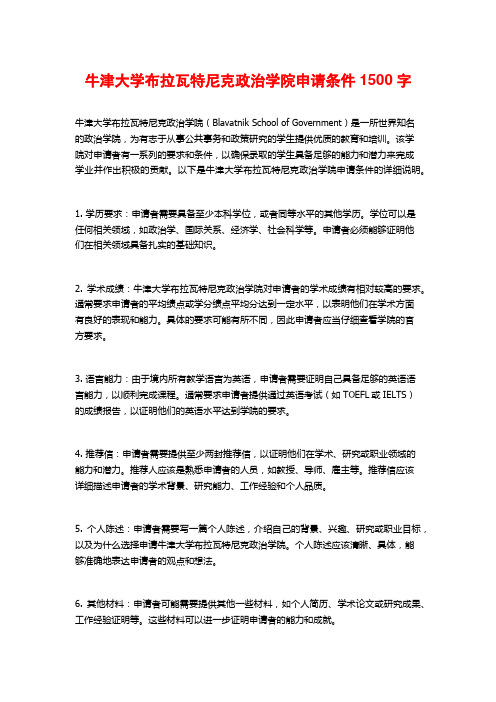
牛津大学布拉瓦特尼克政治学院申请条件1500字牛津大学布拉瓦特尼克政治学院(Blavatnik School of Government)是一所世界知名的政治学院,为有志于从事公共事务和政策研究的学生提供优质的教育和培训。
该学院对申请者有一系列的要求和条件,以确保录取的学生具备足够的能力和潜力来完成学业并作出积极的贡献。
以下是牛津大学布拉瓦特尼克政治学院申请条件的详细说明。
1. 学历要求:申请者需要具备至少本科学位,或者同等水平的其他学历。
学位可以是任何相关领域,如政治学、国际关系、经济学、社会科学等。
申请者必须能够证明他们在相关领域具备扎实的基础知识。
2. 学术成绩:牛津大学布拉瓦特尼克政治学院对申请者的学术成绩有相对较高的要求。
通常要求申请者的平均绩点或学分绩点平均分达到一定水平,以表明他们在学术方面有良好的表现和能力。
具体的要求可能有所不同,因此申请者应当仔细查看学院的官方要求。
3. 语言能力:由于境内所有教学语言为英语,申请者需要证明自己具备足够的英语语言能力,以顺利完成课程。
通常要求申请者提供通过英语考试(如TOEFL或IELTS)的成绩报告,以证明他们的英语水平达到学院的要求。
4. 推荐信:申请者需要提供至少两封推荐信,以证明他们在学术、研究或职业领域的能力和潜力。
推荐人应该是熟悉申请者的人员,如教授、导师、雇主等。
推荐信应该详细描述申请者的学术背景、研究能力、工作经验和个人品质。
5. 个人陈述:申请者需要写一篇个人陈述,介绍自己的背景、兴趣、研究或职业目标,以及为什么选择申请牛津大学布拉瓦特尼克政治学院。
个人陈述应该清晰、具体,能够准确地表达申请者的观点和想法。
6. 其他材料:申请者可能需要提供其他一些材料,如个人简历、学术论文或研究成果、工作经验证明等。
这些材料可以进一步证明申请者的能力和成就。
总的来说,牛津大学布拉瓦特尼克政治学院对申请者有相对较高的要求,包括学历、学术成绩、语言能力、推荐信、个人陈述和其他材料。
2022年牛津大学法学院硕士申请条件
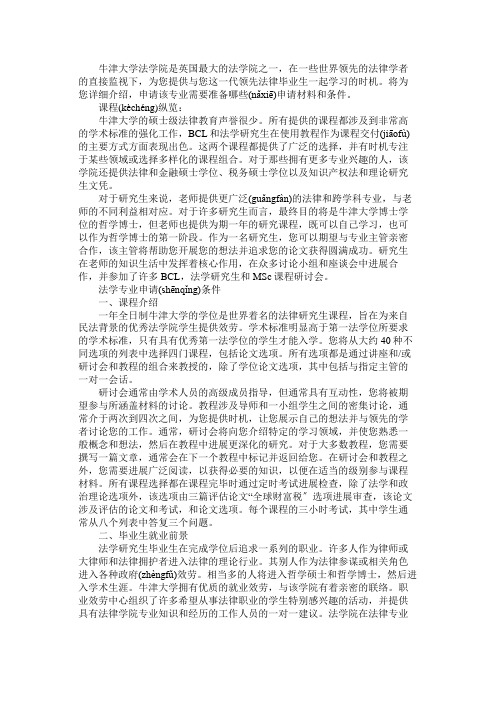
牛津大学法学院是英国最大的法学院之一,在一些世界领先的法律学者的直接监视下,为您提供与您这一代领先法律毕业生一起学习的时机。
将为您详细介绍,申请该专业需要准备哪些(nǎxiē)申请材料和条件。
课程(kèchéng)纵览:牛津大学的硕士级法律教育声誉很少。
所有提供的课程都涉及到非常高的学术标准的强化工作,BCL和法学研究生在使用教程作为课程交付(jiāofù)的主要方式方面表现出色。
这两个课程都提供了广泛的选择,并有时机专注于某些领域或选择多样化的课程组合。
对于那些拥有更多专业兴趣的人,该学院还提供法律和金融硕士学位、税务硕士学位以及知识产权法和理论研究生文凭。
对于研究生来说,老师提供更广泛(guǎngfàn)的法律和跨学科专业,与老师的不同利益相对应。
对于许多研究生而言,最终目的将是牛津大学博士学位的哲学博士,但老师也提供为期一年的研究课程,既可以自己学习,也可以作为哲学博士的第一阶段。
作为一名研究生,您可以期望与专业主管亲密合作,该主管将帮助您开展您的想法并追求您的论文获得圆满成功。
研究生在老师的知识生活中发挥着核心作用,在众多讨论小组和座谈会中进展合作,并参加了许多BCL,法学研究生和MSc课程研讨会。
法学专业申请(shēnqǐng)条件一、课程介绍一年全日制牛津大学的学位是世界着名的法律研究生课程,旨在为来自民法背景的优秀法学院学生提供效劳。
学术标准明显高于第一法学位所要求的学术标准,只有具有优秀第一法学位的学生才能入学。
您将从大约40种不同选项的列表中选择四门课程,包括论文选项。
所有选项都是通过讲座和/或研讨会和教程的组合来教授的,除了学位论文选项,其中包括与指定主管的一对一会话。
研讨会通常由学术人员的高级成员指导,但通常具有互动性,您将被期望参与所涵盖材料的讨论。
教程涉及导师和一小组学生之间的密集讨论,通常介于两次到四次之间,为您提供时机,让您展示自己的想法并与领先的学者讨论您的工作。
- 1、下载文档前请自行甄别文档内容的完整性,平台不提供额外的编辑、内容补充、找答案等附加服务。
- 2、"仅部分预览"的文档,不可在线预览部分如存在完整性等问题,可反馈申请退款(可完整预览的文档不适用该条件!)。
- 3、如文档侵犯您的权益,请联系客服反馈,我们会尽快为您处理(人工客服工作时间:9:00-18:30)。
Updated February 2014 Recognised StudentsInformation for applicants and studentsStatusRecognised Student status is a special status for postgraduate research students who are registered with another university, and who have been admitted by a University faculty or department at Oxford to undertake research for their DPhil under the guidance of an Oxford academic.If admitted, you will be allocated an Academic Advisor, who will give general advice about the research topic, but not systematic instruction, such as reading and commenting on written work, as you are expected to be sufficiently well advanced in your studies to undertake research largely unsupervised. The Advisor would normally expect to see you only two or three times each term, and would discuss the work as a colleague rather than as a teacher. Your advisor will write a report on your academ ic progress on the University’s Graduate Supervision System, and you will be asked to contribute to this during weeks 6 and 7 each term: /You will not be affiliated to an Oxford college or hall, and will not receive an Oxford qualification or any formal accreditation for your studies at Oxford. Your admission is at the discretion of the faculty or department concerned.You can only hold your Recognised Student status for a maximum of three terms.Your status is formalised in the Examination Regulations, which are reproduced at the end of this document: /examregs/50-00_21_RECOGNISED_STUDENTS.shtml Term DatesThe term dates for the academic years 2014-15 and 2015-16 are as follows:Michaelmas 2014: 12 October 2014 – 6 December 2014Hilary 2015: 18 January 2015 – 14 March 2015Trinity 2015: 26 April 2015 – 20 June 2015Michaelmas 2015: 11 October 2015 – 5 December 2015Hilary 2016: 17 January 2016 – 12 March 2016Trinity 2016: 24 April 2016 – 18 June 2016Application and offerThe recommended application deadlines are:Term of admission EU/Swiss applicants All other applicantsMichaelmas 2014: 1 August 2014 2 June 2014Hilary 2015: 3 November 2014 1 September 2014Trinity 2015: 2 February 2015 1 December 2014Please note that it is your responsibility to check how long it will take to obtain a Visa in your country and to plan the submission of your application accordingly.You should ensure that the start of your stay corresponds with the start date of any particular academic term. In order to start the application process you need to get in touch with the department where you intend to apply and obtain agreement from them, and from a member of the academic staff who is prepared to act as your Academic Advisor1. You will then be sent an application form to complete, which should be submitted to the Graduate Admissions Office, University Offices, Wellington Square, OX1 2JD, United Kingdom.As part of the application, you will be asked to provide:1.evidence of the degrees previously obtained;2. a statement of between 500 and 1,000 words outlining the proposed subject of yourresearch.3.two references from senior members of faculty at your current University4. a letter from a Professor or Head of the Department of the University of Oxford supportingthe application.5. a letter from a member of the academic staff prepared to act as Academic Advisor.If the department approves your admission, your Academic Advisor will be appointed and you will receive:an offer letter specifying the admitting body and terms for which you have been admitted.a Student Contract. This should be completed and returned to the Student Information &Advisory Service (at the Examination Schools, High Street, Oxford, OX1 4BG) before you arrive at Oxford.If the department awards you with a bursary, you will also receive a Financial Sponsorship Letter with details of the award.It is not possible to be admitted as a Recognised Student if you have already been matriculated as a member of the University of Oxford. In such a case, the only possibility is to return as a matriculated non-award student, which requires a college place, and incurs the full overseas fee rate on both the University and college side.(/feesandfunding/fees/information/universityrates/ )International StudentsIf you are a non-EEA /Swiss national, as soon as you receive your Offer Letter, you will need to start applying for your visa. On your request, your department will arrange for a Confirmation of Acceptance to Study (CAS) number (if you are going to apply for a Tier 4 visa) or a Student Visitor Letter (if you are going to apply for a Student Visitor visa) to be provided to you. You must either apply for a student visitor visa before coming to the UK if you are a visa national, or you must show the letter on arrival in the UK if you are a non-visa national see the website for further information: /students/international_students/visabefore/If you come in under a Student Visitor Visa, you should be aware in advance that you will not be able to extend your stay in the United Kingdom as a student visitor beyond the six months allowed; and you will not be permitted to take any employment in the UK. You cannot switch from student visitor into Tier 4 visa status within the UK. Please note that the Visitor (General) visa allows no study at all, neither can you switch status to Tier 4 from within the UK.English language requirementsIt is essential that you meet the UK Home Office requirements in order to obtain a visa to enter the UK.Please note that, unless you are a national of a majority English-speaking country, as defined by the UK Home Office (see Appendix A), or have completed a full-time degree-level course of a minimum of 9 months, entirely taught and assessed in English, then you are required to submit evidence of language test results, which should be no more than two years old at the start of yourstudy in Oxford, from one of the language tests that the University approves, in order to meet UK Government regulations regarding the minimum English language requirements to obtain a UK Tier 4 visa (see Appendix B).We will then include a statement on your CAS (Confirmation of Acceptance for Studies) for your visa confirming that you have met the minimum UK Home Office requirements.It is recommended that for detailed information about Tier 4 Visa and Student Visitor Visa, you consult the UK Home Office website available through the following link:/studyingintheuk/. Information and advice on visas and immigration is also available on the University’s web pages for students:/students/international_students/ or fromstudent.immigration@ .Finally, in line with requirements from the UK Home Office, you must have your passport scanned when you report to Student Information on your arrival. If applicable, you should also ensure that you register with the police.Criminal convictionsPlease note that this question is mandatory and must be answered.To help the University reduce the risk of harm or injury to students and staff caused by any criminal behaviour of students, we must know about any relevant convictions that you may have. If you declare a criminal conviction your application will still be assessed according to the published selection criteria for the programme you have selected. All published selection criteria focus on academic excellence. If you disclose a criminal conviction the information on your conviction will be passed to appointed University and college staff, who will consider your application separately from your academic achievements. The University may want to ask you for more information before a decision is made. Third parties may also be approached for information, but this will not be done without your permission.If you are charged with a relevant criminal offence after you have submitted your application, or after you have been made an offer, you must tell the University as soon as possible. When you do so, the same process as for convictions declared at the time of applying will be carried out; this process is detailed above.If you fail to declare a relevant criminal conviction at any point in the admission process, then your application will be considered to be fraudulent and the University, or any College of the University, will retain the right to withdraw your application. If you have been made an offer by the University, or any College of the University, then the University, or any College of the University, may in these circumstances withdraw or amend that offer. If you have been admitted as a student, you may be subject to disciplinary action which could result in your expulsion from the University and your College.Declaring relevant unspent criminal convictionsYou must declare any unspent criminal convictions related to:offences against the person, whether of a violent or sexual natureconvictions for offences involving unlawfully supplying controlled drugs or substanceswhere the conviction concerns commercial drug dealing or traffickingoffences where you are currently serving a prison sentence for a relevant criminalconviction. In these circumstances you must give the prison address as your postaladdress in the contact details on the application form. In addition, a senior prison officermust support your application.Applicants from within the UK and European Economic AreaConvictions that are spent (as defined by the Rehabilitation of Offenders Act 1974) are not considered to be relevant and you do not need to disclose them. If you are unsure whether a caution is relevant or spent, you should get advice from a Citizen Advice Bureau, the Probation Service or Nacro, the crime reduction charity. If you seek advice from a solicitor you may have to pay for that advice.Note that offences attracting sentences of 30 months imprisonment or more are never spent and therefore must always be declaredApplicants from outside the UK and European Economic AreaThe Rehabilitation of Offenders Act 1974 (the Act) is relevant to those of all nationalities and residencies, and the con cept of “spent” convictions as set out in the Act applies regardless of the jurisdiction of the court where the offender was convicted. However, you should note the following:Whilst a conviction acquired outside Great Britain may be spent under the relevantnational law, it is not automatically deemed spent under English law.In determining whether a conviction is capable of becoming spent, a sentence imposed bya court outside of Great Britain will be treated in the same way as the correspondingsentence under English law, or its nearest equivalent.Where a sentence is imposed by a court outside of Great Britain, the period before whichthe conviction is deemed spent will be calculated according to English law, as set out inthe Act.If you are unsure whether your conviction is deemed relevant and spent under English law then we strongly advise you to seek legal advice before answering this question.If you require a visa or you are extending your visa, then you must declare any unspent criminal convictions, including driving offences, when you apply to the UK Home Office. Please see sections 18 and 19 of the Home Office document 'Part 9 - General grounds for the refusal of entry clearance, leave to enter or variation of leave to enter or remain in the UK'for information regarding possible circumstances under which a visa application may be refused.Data ProtectionAll records and correspondence relating to an applicant declaring a relevant criminal conviction will be securely stored in accordance with the University’s Data Protection Policy which can be found at: /dataprotection/policy/If you have declared a criminal conviction and your application is successful, all records and correspondence relating to your application will form part of your personal record but will be stored separately from other applications.If you have declared a criminal conviction and your application is unsuccessful, all records and correspondence relating to your application will be destroyed in accordance with the University’s Policy on handling personal data, including sensitive personal data, which can be found at: /students/data .Your consent will always be obtained before seeking further information about any declared convictions from third parties.FeesRecognised Students must pay tuition fees. See:/feesandfunding/fees/information/universityrates/201415recognisedstudents/for details of fees by subject for Recognised Students.This covers the cost of the access to the University facilities and the cost of the guidance provided by your Academic Advisor. Tuition fees do not include college fees (as you will not be affiliated with any college), accommodation, or other course and maintenance fees. Some departments may provide bursaries to cover the cost of the tuition fees.How to pay your feesYou will be sent an invoice by email for the payment of your fees (unless your fees are being paid by an employer/sponsor, in which case you will have to ask that an invoice be raised for them –see below)Fees must be paid within fourteen days of the start of term and failure to do so will result in the cancellation of your admission. You may pay for more than one term at a time if you wish. If your department has given you a bursary that covers your fees, you will not need to pay any fees, but you must bring along your letter of financial sponsorship to Student Information (see ‘Arriving at Oxford’).Online ShopIt is most advisable that you pay your fees by credit/debit card through our Online Shop – you can then make your payment at any time, and your payment will be processed in the quickest possible way. You are strongly advised to make your payment prior to your arrival in Oxford.Debit/Credit Cards accepted: Visa, Visa Debit, MasterCard, Maestro Switch, Visa Electron, Solo.To use this method of payment please follow the below link:/In the Menu on the left please choose ‘Product Catalogue’. From the list of available departments choose ‘Student Information’ and then click on the product called ‘SI -Recognised Student Fees’. You will also be asked to enter the number of your particular invoice, so please make sure you have it to hand when making your payment.If you have any difficulty paying via the Online Shop please contact Student Information at rmation@.IMPORTANT REMINDERS:Please note that in order to complete your payment successfully you need to put the total amount of fees you want to pay in the price field available. Otherwise the total amount paid will show as £0.00.Before you attempt to make a payment, please check with your bank if there is a limit that you can spend on your credit/debit card at any one time or in any one month as often this is the reason why payments are not being authorised.Employer/Sponsor InvoiceIf your employer/sponsor is funding your studies they will require an invoice which you must request prior to your arrival in Oxford.In order to arrange this please e-mail rmation@ with the following details:Purchase Order Number (if applicable)Company nameCompany addressCompany Contact nameCompany Telephone and email addressDepartment/Faculty that you are joiningIf you have been admitted for more than one term please indicate if your employer/sponsor requires one invoice or separate termly invoices.To arrange any other payment methods please e-mail rmation@Arriving at OxfordOnce you have arrived at Oxford and before the end of Week 2 of term, you need to come to Student Information (SI) to pay your fees (if still applicable) and to undertake a small number of administrative tasks. SI is based at the Examination Schools, and you should come at any time from 9.30am to 11.30am.When you received your offer letter from the department/faculty, you should also have received a Student Contract. Once you have returned your Student Contract and paid your fee you will be issued with a University Card. You will need this card for admission to the Bodleian Library and other University Libraries and to use Computing Services and the Language Teaching Centre. In some departments, you will need it as a payment card or to enter buildings which have swipe-card access control. It will also act as an identity card whenever you are on college or university premises.All Recognised Students must bring their passport to SI to identify themselves. If you not a national of the EEA or Switzerland and you have been issued with a Tier 4 visa, you must have your passport scanned when you report to Student Information on your arrival. This is a requirement of the UK Home Office. If your visa states that you need to register with the Police (clearly indicated on the visa) you must report to them within 7 days. This is only a requirement for some students and will be stated on your Entry Clearance (visa) sticker in your passport or will have been stamped into your passport by the Immigration Office when you arrived in the UK. When you come to SI, you should therefore bring:The letter of admission that the faculty or department sent you;Any financial sponsorship letter that you have received from your department;Your passport;A completed Student Contract and passport size photo (if you have not already sent thisin).Unlike other Oxford students, you will not need to register online on arrival. The SI team will complete the registration process on your behalf.Access to facilitiesYou are entitled to use the University Libraries and attend lectures advertised in the lists of boards of faculties and other bodies, provided that attendance(a) at lectures described as seminars or classes or informal instruction shall be subject to the permission of the holder,(b) at lectures given in any college building shall be subject to the right of the college concerned to refuse admission.You are also entitled to study/conduct your research in any University department or institution subject to the agreement of the Head of that department or institution.AccommodationYou are strongly advised to organise accommodation before you arrive in Oxford. You will not be a member of a college, so you will not have access to college accommodation and the Accommodation Office regrets it is no longer able to offer graduate housing to Recognised Students.You can look for University-approved private housing through the Studentpad facility -/Home.Other places to look include the Oxford Gumtree website (/oxford ) and the Oxford Daily Info website (/ ).The North Oxford Overseas Centre also offers accommodation for international students -/ .If you arrive without having secured more permanent accommodation you might like to stay temporarily at one of Oxford’s two youth hostels until you find a place. This should be an emergency option only:/home.php/find-accommodation/heart-of-england/hostels/oxford/index.aspxWhat if I have to postpone or cancel my study?If your circumstances have changed and you have to postpone your arrival, please contact your department and the appropriate Graduate Studies Assistant to make alternative arrangements: /students/course_guidance_supervision/graduates/contacts/If you have to cancel your stay at the University of Oxford, please inform your department (and the appropriate Graduate Studies Assistant) as well as Student Information (by e-mailing rmation@ ).If you have been issued a CAS number to apply for a visa, or have been issued a Tier 4 visa this may need to be withdrawn.Examination Regulations for Recognised Students1. There shall be a Register of Recognised Students who are not members of the University.2. The Board of a faculty or divisional board may place the name of any applicant on the Register of Recognised Students: provided that the applicant:(a) is not a member of the University,(b) possesses the qualifications required from candidates for admission to the status of Senior Student except that persons not so qualified may in exceptional cases be admitted,(c) is placed under an academic advisor appointed by the board. It shall be the duty of the academic advisor to advise on the work of the student but not to give systematic instruction. He or she shall submit a report on the progress of the student to the Board at the end of each term.3. Application for admission as a Recognised Student shall be made to the Academic Registrar and Secretary of Faculties for submission to the appropriate faculty board and shall be accompanied by(a) evidence of the degrees previously obtained by the applicant,(b) a statement of the proposed subject of study,(c) a certificate from a professor or head of a department of the University of Oxford supporting the application.4. If an applicant for admission as a Recognised Student shall propose a subject of study which is outside the scope of the board of any faculty or divisional board but which may in the opinion of the Education Committee be profitably studied at Oxford, that committee may, on the recommendation of a delegacy or committee constituted under the provisions of the appropriate regulation, deal with his or her case as if it were the board of a faculty.5. For each term for which his or her name is on the Register, every Recognised Student shall pay to the Curators of the University Chest, within fourteen days from the beginning of Full Term (or from the date of the decision to place his or her name on the Register, in the case of a decision taken during Full Term and applying to that term), a fee at the annual rate specified in the appropriate regulation.6. A Recognised Student shall cease to hold that status(a) if he or she shall have failed to pay the fees required under clause 5,(b) if his or her name shall have been removed from the Register by the faculty or divisional board concerned.7. Every Recognised Student shall be entitled(i) to use the University Libraries subject to the provision of the statutes governing particular Libraries,(ii) to attend lectures advertised in the lists of boards of faculties and other bodies:Provided that attendance(a) at lectures described as seminars or classes or informal instruction shall be subject to the permission of the holder,(b) at lectures given in any college building shall be subject to the right of the college concerned to refuse admission.(iii) to work in any University department or institution subject to the agreement of the head of that department or institution.8. No Recognised Student shall have his or her name on the Register of Recognised Students for more than three terms.9. A faculty or divisional board shall have power to remove from the Register the name of any Recognised Student which it has placed on the Register.Appendix AMajority English-speaking countries, as defined by the UK Home Office:AustraliaCanadaNew ZealandUnited States of AmericaCaribbean: Antigua and Barbuda, The Bahamas, Barbados, Dominica, Grenada, Jamaica, St Kitts and Nevis, St Lucia, St Vincent and the Grenadines, Trinidad and TobagoSouth America: Belize, GuyanaAppendix BThis table gives an indication of the equivalence of English language proficiency tests.*For IELTS the Home Office minimum of 5.5 in all components is lower than the University admission requirement of 6.5 or 7.0 in all IELTS components.11。
